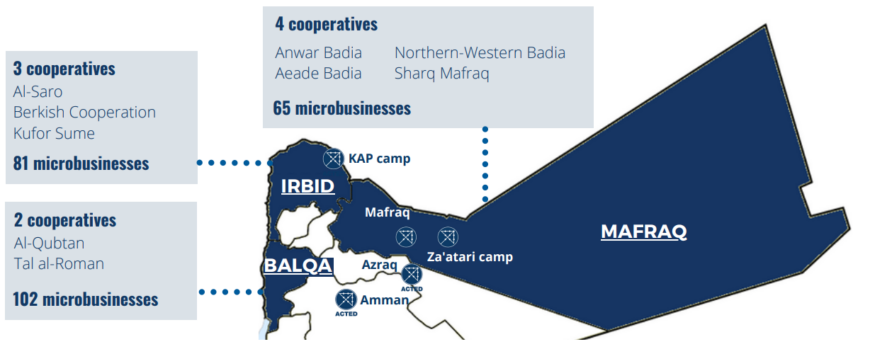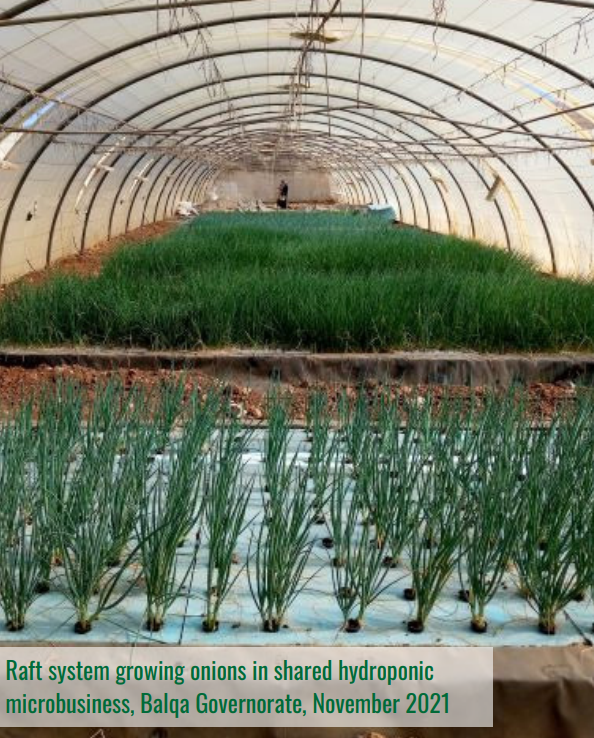Providing sustainable work opportunities to refugees and vulnerable Jordanians in the agricultural sector
ACTED supported agricultural cooperatives and micro businesses to foster sustainable growth and livelihood.
In Jordan, 25% of the population depend on agriculture as a source of livelihoods, particularly Syrian refugees whose work permits are, in majority, issued in this sector. However, its expansion is limited by scarce support services, technical and financial capacities and seasonal fluctuations in income.
To address these challeges, ACTED fostered innovative agricultural practices and business management support to improve livelihood opportunities and resilience for approximatively 1,350 vulnerable Jordanian and Syrian-refugee farmers.
Our main achievements
With ACTED’s support, 897 farmers implemented innovative agricultural practices
ACTED reinforced capacities of 9 agricultural cooperatives:
- Capacity building of 9 cooperatives, through business development and marketing trainings as well as grants award, reaching 450 members.
- Grant provision for 2 business solutions to improve small farmers access to market.
- In collaboration with Badia Fund, establishment of revolving microloan portfolios for small farmers within 2 Mafraq cooperatives.
- Facilitated the engagement among agricultural stakeholders through the creation of 9 Agricultural Initiative Support Groups.
ACTED helped start and scale up 248 agricultural microbusinesses:
- Supported microbusinesses operating in 9 different sectors such as hydrophonic, conventional agriculture, greenhouses or food processing.
- Following their participation in the project, 89% of beneficiaries reported that they have observed an increase in their monthly income.
- Provision of 222 small grants to microbusiness owners to support their activity and gain market access.
- Tailored technical trainings carried out to 897 Syrian refugees and vulnerable Jordanians to engage in, restart or expand their microbusinesses.
Supporting agricultural cooperatives
Kufor Sume Cooperative based in Irbid
ACTED’s intervention helped Kufor Sume grow its yearly turnover from 6,000 to 13,000 JDs between 2019 and 2021 and provide efficient agriculture development services to 4,245 annual beneficiaries such as:
- Provision of 47,000 JDs in microloans to support 34 entrepreneurs business development.
- Annual distribution of chickens and vegetable seedling to 820 families for livelihood activities.
- Supporting the economic empowerment of women through specific trainings.
August 2021, ACTED selected Kufor Sume’s proposed business solution designed to diversify market access for its members. Through ACTED’s suppport, the cooperative rented an heritage Jordanian house and rehabilitated it into a restaurant and a local shop. The solution is an opportunity for farmers to expand their market access by buying ingredients from local farmers.
The house also serves as an handicrafts training centre which are sold in the shop. In June 2022, 74 individuals, both Syrian refugees and Jordanians benefited from the solution.
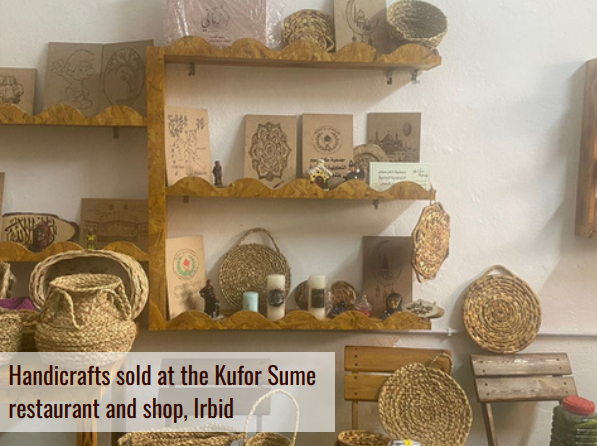
Aeade Al-Badia Cooperative based in Mafraq
Aeade Al-Badia cooperative provides water and agricultural services for its 1,845 annual beneficiaries as well as the surrounding community to promote inclusive livelihood development. Under ACTED’s intervention, the cooperative contributed to:
In August 2021, ACTED selected Aeade Al-Badia’s proposed business solution, designed to facilitate access to bazars for its members. Thanks to ACTED’s contribution, the cooperative acquired a refrigerated truck to increase farmers’ access to bazars in Amman and the rest of Jordan. Aeade Al-Badia also signed a cooperation agreement Jordan’s #1 Bazars coordinator.
In June 2022, 361 individuals Syrian refugees and Jordanians, signed agreements with Aeade Al-Badia to benefit from the solution.
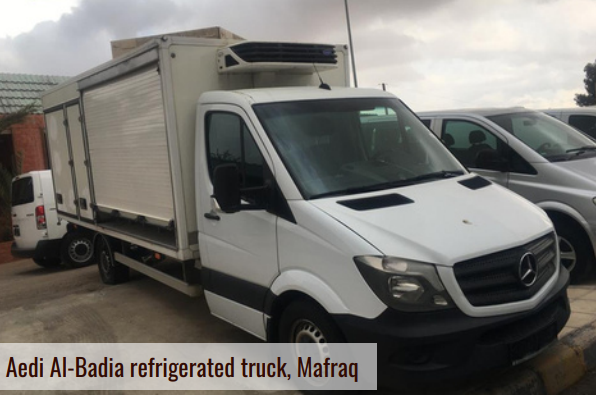
Supporting agricultural businesses
Contributing to women economic empowerment
Ahlam, a Jordanian woman, has been running her beekeeping business in Irbid since 2018. Her husband had an accident in 2019 that prevented him from working. Thanks to ACTED’s intervention, Ahlam was able to strengthen her business and financially support her household on her own throughout her husband’s incapacity.
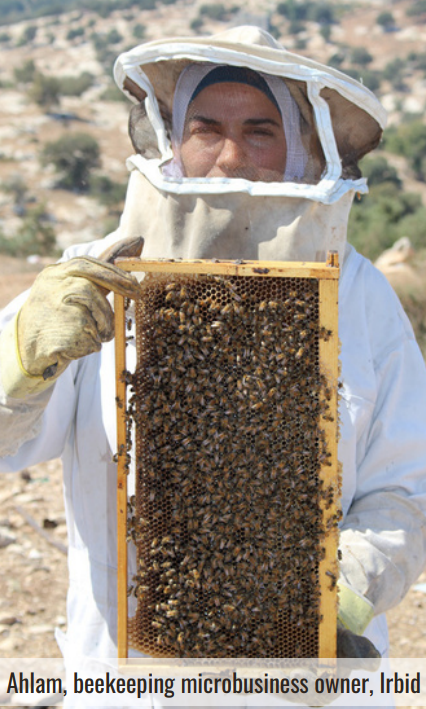
My project was only an idea, but I decided to implement it after participating in the field schools. The project provided me with work opportunities, I was a housewife and now I can support my children and my husband.
Thanks to the field school trainings and dialogues in Peer Support Groups carried out under the project, Ahlam enhanced her beekeeping skills and business knowledge. Through ACTED’s financial support, she managed to buy 11 beehives and produced 250 kilograms of honey.
Diversifying farmers income opportunities
Fouza, a Jordanian woman, first started wheat farming to bake and sell bread in Mafraq. However, with ACTED’s support she chose to develop hydrophonics agriculture instead as it is less water-consuming.
With ACTED’s fiancial contribution, Fouza managed to buy some livestock and launch a small perma-garden to support her family’s food intake.
Fouza is now looking into expanding her business into experiential tourism. With ACTED’s help, she has successfully enlisted her farm on Sawwah digital app, a travel booking platform that promotes local travel experience.
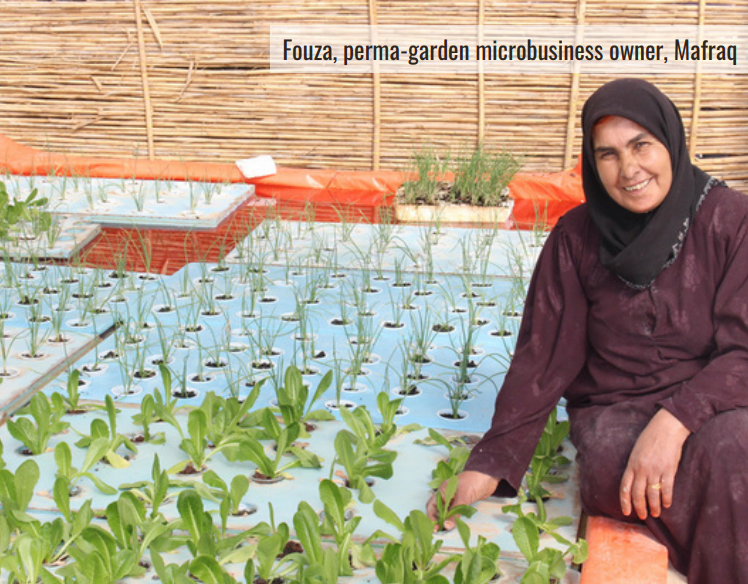
Fostering climate-smart techniques
Nadia, a 56 year-old Jordanian woman, had never worked before getting involved with ACTED. Supporting her 12 kids, she is now one of the 5 members of a shared hydrophonics microbusiness in Mafraq.
Thanks to ACTED’s grant, the business first started with food processing activities such as pickles and jams production. Through the trainings and field days, Nadia was encouraged to adopt hydrophonics technique after witnessing firsthand the success of the farms that had implemented it and the amount of water it saves. Nadia’s business also benefited from the support of ACTED’s engineer to overcome challenges with the fertiliser production.
We learned from each other and did research online to develop the project. Every day, we work and cook together to develop our products.
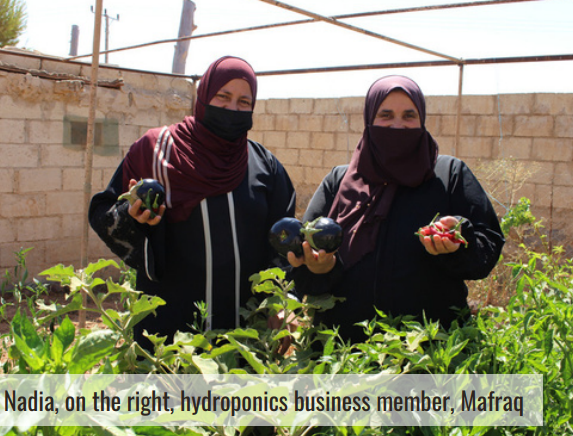
Introducing innovative agricultural practices
Six microbusinesses supported in Balqa and Mafraq have started to sell azolla surplus to local famers, thus ensuring access to a new source of income. Azolla farming has helped farmers raise chickens at lower costs by reducing the monthly livestock feeding expenses by 80% to 90%.
After witnessing the financial benefits from azolla production, farmers have already begun to spread their knwoledge and teach their friends and neighbours on how to replicate this approach.
Azolla is a new agricultural crop that did not previously exist in the area, it is easy and profitable with low production costs.
Facilitating acess to markets
Suha, a 39 year-old woman is one of the 4 members of a women-led confectionery microbusiness from Irbid. A housewife before ACTED’s intervention, Suha chose the food processing sector as she has always had a talent for baking back in Syria. Even though the COVID-19 pandemic was particularly challenging for her business, thanks to ACTED’s mentoring and coaching, Suha and her partners kept their activity running.
I bettered myself and grew more with ACTED, I'm proud that I worked in this project.
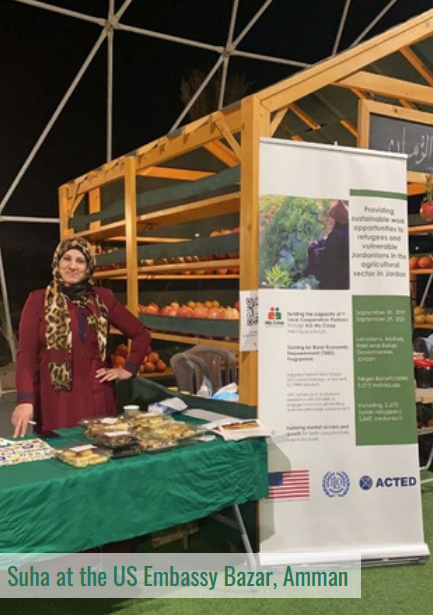
Through ACTED’s support, Suha’s microbusiness gained access to new markets. In 2021, she had the opportunity to participate in 2 Bazars to showcase and sell her products. One of her fondest memories under this project was when she attended the Bazar at the Amercian Embassy in Amman.
Expanding customers outreach
Kifaya is a Jordanian woman who is now a member of a baked goods microbusiness in Irbid, shared by 7 women and 1 man, and launched under ACTED’s intervention. Kifaya has 5 children, and thanks to the income generated from her business, she is now able to support her 2 eldest children who are attending university.
Moreover, ACTED’s support helped her expand her market size by participating in Bazars both in Amman and Irbid. She participated for 3 days in the Olive Oil Festival in Amman where she earned approximatively 2,500 JDs (€3,543) by selling her products. She also took part in the Irbid Pomegranate Festival where she made around 1,500 JDs (€2,126). Thanks to her participation, Kifaya has now developed a regular pool of customers in Amman.
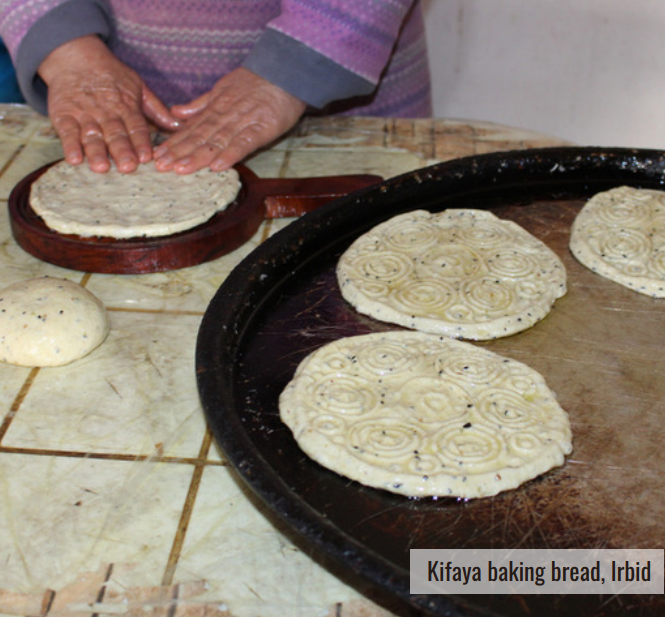
Next steps in supporting vulnerable farmers in Jordan
Moving forward, ACTED is building upon its best practices and expertise to expand its support to vulnerable Jordanians and Syrian refugees from recovery to long-term resilience. ACTED’s long-term agricultural programming (2022-2025) revolves around the following approaches:
- Leverage climate adaptative and regenerative approaches for efficient land use and water management through perma-garden models.
- Foster market linkages and integration, including e-commerce platforms, wholesale markets, trade fairs, seasonal bazars and networking events for agricultural stakeholders.
- Facilitate farmer’s livelihood diversification through food processing, artisan activities and eco-tourism to ensure year-round income.
- Strengthen local capacities among government, private and civic stakeholders and raise awareness on decent work and labour rights.

Through its Flagship Programme, THRIVE (Towards Holistic Resilience in Vulnerable Environments), ACTED is committeed to regenerate agricultural ecosystems.
Integrated approach based on livelihoods, market viability and social cohesion to improve soil health and crop productivity in (semi-)arid agricultural rangelands, thereby leading to increased income generation. THRIVE is alignes with SDGs, the UN Convention to Combat Desertification and Decade on Ecosystem Restoration (2021-2030).
This programmatic strategy is based on 3 components: soil regeneration, financial empowerment of local farmers and populations as well as support to sustainable agricultural and economic development. This is currently implemented across 7 countries in Africa and the Middle East, including Jordan, where is supports approximatively 311,232 beneficiaries.
With continued financial support from BPRM (2021 to 2023), ACTED will build on the previous programme to enable diversification and sustanability of year-round income streams, particularly through food processing and artisanal livelihoods, while also promoting integrated farming techniques.
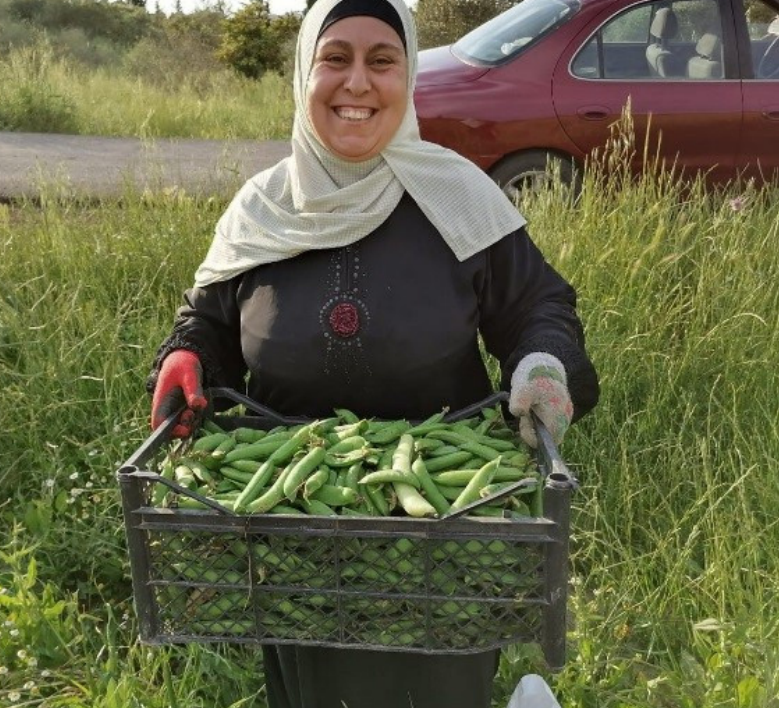
ACTED is building upon its best practices and expertise to expand its support to vulnerable Jordanians and Syrian refugees from recovery to long-term resilience.
With continued financial support from donors, ACTED will build on the previous programme to enable diversification and sustainability of year-round income streams, creating further work opportunities for refugees and vulnerable Jordanians in the agricultural sector.
ACTED will also utilise its global flagship, THRIVE, which promotes efficient land management and sustainable water resource management for improved soil health and crop productivity, and therefore enhanced income generation.

